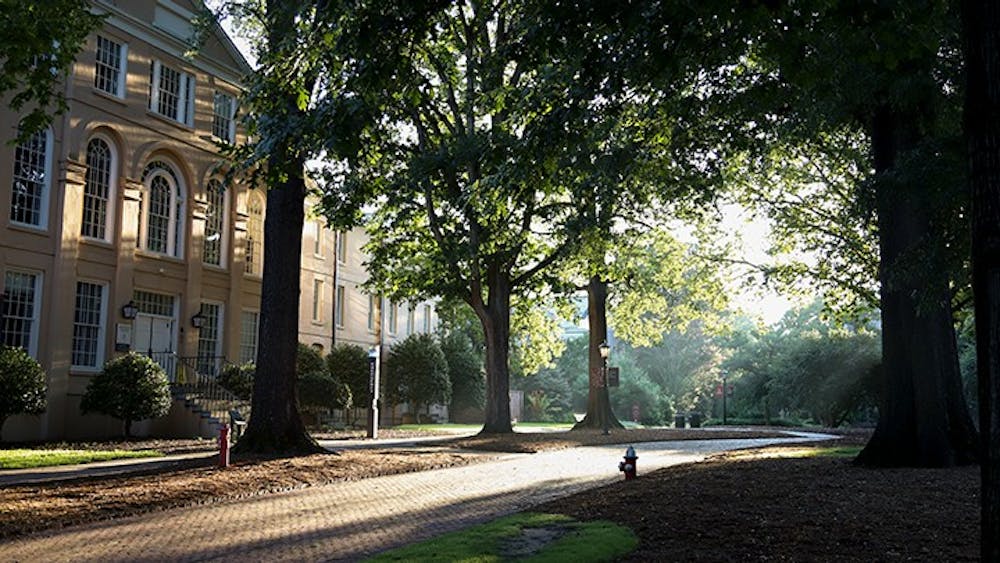The new leaders of USC’s Graduate Student Association (GSA) hosted a virtual retreat for their first meeting Monday night.
The meeting began with the executive officers’ and secretaries’ introductions, followed by a rundown of the GSA’s goals by president Maggie Carson, a Ph.D. student in environmental health sciences.
The first of these goals, Carson said, is to increase communication between the graduate school, graduate students and the university as a whole.
“A lot of complaints that I often hear and I have complained myself that graduate students sort of feel left out in the university, that we're not focused on, that we, a lot of their resources aren't tailored to our specific needs," Carson said.
Carson also said the GSA would like to establish graduate students as “major stakeholders” in the university. USC currently serves nearly 7,000 students in graduate programs.
Additionally, Carson said she and vice president Max Akonde, are working with the USC's Vice President of Diversity, Equity and Inclusion Julian Williams, on the Revision 2020 campaign.
“We just want to increase opportunities for underrepresented minorities of all kinds, for graduate students specifically, whether that's funding, or just more opportunities,” Carson said.
Some of this work includes strengthening programs such as the Grace Jordan McFadden Professors Program, which provides $24,000 over four years for minority students interested in becoming professors.
Following these goals being set, a variety of speakers gave presentations regarding different facets of graduate student life.
Anna Edwards, associate vice president of student life, discussed the possibility of a University 101-esque program for graduate students.
“That course is really geared towards a first-time, first-year college student. I think if there is an opportunity to introduce graduate students to the University of South Carolina, there could be some type,” Edwards said. “Maybe not in the same format as a credit-bearing course, but it would be a fair or some type of orientation program. I do think there's some value in that.”
Edwards said she would “definitely be willing” to explore how such an experience would be delivered and what topics should be covered.
International Student Services also offers means for international graduate students to get acquainted with USC’s campus, director Lauren Smith said, in the form of the Buddies Beyond Borders program. This program partners new international students with either domestic or experienced international students of a similar degree level.
However, Akonde, an ambassador for the program, said the program is short on graduate students looking to take a buddy under their wing, leading to some overburdened buddies.
“As someone who used that program, my experience is not so good because I was paired with, you know, someone, a local, who had another buddy, so it was a lot on her for us to make time and share their experiences and stuff,” Akonde, a doctoral candidate in epidemiology, said.
One of the GSA’s projects for the upcoming semester will be reaching out to graduate students to garner interest in the program.
Finally, Caslen spoke about the return to campus amidst COVID-19, leading with an appeal to the students’ self-control.
“Normally, traditionally, graduate students are a little bit more mature, which means they don't find themselves in that really high risk place at one o'clock in the morning and things like that,” Caslen said.
In the event that COVID-19 levels on campus become unacceptably high, though, Caslen did say that the university would “scatter,” cancelling in-person instruction and closing on-campus residence halls.
“None of us wants that. But you know we have to do it, we have to do it. I really don't want it,” Caslen said.
However, even if this occurs, Caslen said, it wouldn’t be sufficient to keep students safe.
“If we are smack in the middle of September and we have the same sort of situation UNC has and we say ‘Okay everybody, go home,’ most everybody who's off campus is going to stay there, you know, so what problem does that solve? So it doesn't solve the problem, because the risky situation is off-campus, social activities,” Caslen said.
However, Caslen said he was optimistic that such a situation would not occur, referring to UNC Chapel Hill’s recent string of COVID-19 outbreaks.
“I am a believer in you. I'm a believer in our underclassmen and women, and I believe that we will persevere and we will do the right thing, you know. Frankly, what happened in North Carolina ought to be a wake up call to every single student on this campus because we don't want that to happen to us,” Caslen said.

